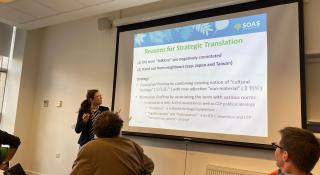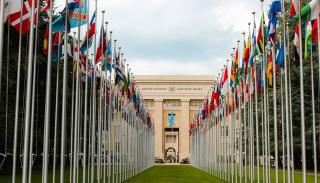
Breadcrumbs navigation
The best books on the United Nations and how it adapts to global challenges
This article was originally published by Shepherd, a book discovery website where authors and experts share their favourite books. We recently embarked on a partnership with Shepherd to showcase our members' books, so we're pleased to share this first article. Look out for further articles by BISA members in the coming weeks. Try their bookshelf on international relations or politics to browse a wide range of recommended books.
Why am I passionate about this?
Despite ongoing debates on the crisis of global governance and the doubts about the relevance of international institutions, the United Nations (UN) remains the central forum for global debates and a key implementer of international programs, such as peacekeeping. Coming from Ukraine, my interest in peacekeeping started with researching Ukraine’s peacekeeping contributions and evolved to include international organizations, international security, and international inequalities. I’m now a Senior Lecturer in International Politics at the City St George’s, University of London. My book (below) is the winner of the 2024 Chadwick Alger Best Book Award by the International Studies Association.
I wrote...
Advocacy and Change in International Organizations: Communication, Protection, and Reconstruction in UN Peacekeeping

What is my book about?
The book conceptualizes advocacy as a crucial but overlooked source of change in international organizations. Different actors—national diplomats, international bureaucrats, external experts, or civil society activists—can advocate for change using one of three advocacy strategies: social pressure, persuasion, and 'authority talk.' The advocacy-focused framework explains the origins of three workstreams of contemporary UN peacekeeping operations: communication, protection, and reconstruction.
The issue of strategic communications was promoted by UN officials through the strategy of persuasion. Protection of civilians emerged due to a partially successful social influence campaign by a coalition of elected Security Council members during the Rwandan genocide and a subsequent (and successful) persuasion effort by Canada. Quick impact projects entered peacekeepers' practice as the result of 'authority talk' by an expert panel.
The books I picked & why
Transforming International Institutions: How Money Quietly Sidelined Multilateralism at The United Nations
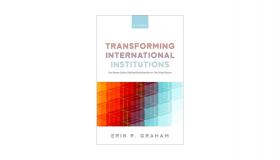
Why did I love this book?
Funding of international organizations is one of the most obscure yet most consequential aspects of their work. Erin R. Graham convincingly demonstrates that the states that created the UN did not foresee the impending decolonization and the loss of the Western majority in the UN General Assembly, the UN body responsible for adopting the organization’s budget. Major donors, unable to maintain control over the regular budget, switched to providing voluntary funding—money that states can choose to give to the UN on their own terms, specifying projects and locations for their use.
The switch did not come about through an overhaul of the UN’s formal rules, but rather as a result of seemingly small, situation-specific decisions. Over time, they have led to the current state of affairs when 75 percent of UN development financing comes from voluntary contributions, undermining the spirit of multilateralism central to the UN.
International Pecking Orders: The Politics and Practice of Multilateral Diplomacy

Why did I love this book?
The book theorizes international diplomats’ social capital as a reflection of their country’s positions in international hierarchies and, to a lesser extent, their individual experience and skill. It focuses, among other examples, on the debates on the reform of the UN Security Council that take place in the UN General Assembly.
Pouliot offers a compelling account of the privileges that the permanent members of the UN Security Council enjoy that extend beyond veto powers, such as the mastery of the Council procedures that come with a permanent seat. The book suggests that besides institutional privileges, countries can also accumulate capital at the UN by providing voluntary funding or contributing peacekeepers.
Dangerous Diplomacy: Bureaucracy, Power Politics, and the Role of the UN Secretariat in Rwanda

Why did I love this book?
The UN’s failure to prevent or stop the 1994 genocide in Rwanda is one of the darkest episodes in the organization’s history. Salton locates some of the responsibility for this failure in the inter-departmental rivalries within the UN Secretariat, in particular, between the Department of Peacekeeping Operations and the Department of Political Affairs.
Based on the memoirs of Marrack Goulding, a Briton who served as the first head of the Department of Peacekeeping Operations when it was created in 1992, the book sheds light on member states’ interference in the UN’s work. It also explores tensions between UN headquarters in New York and the leadership of the UN peacekeeping operation in Rwanda, as well as between the diplomatic and military leadership in the operation itself. Imprecise responsibilities, unclear lines of command, competing priorities, and personal jealousies contributed to the 1994 tragedy.
Assisting International Justice: Cooperation Between UN Peace Operations and the International Criminal Court in the Democratic Republic of Congo
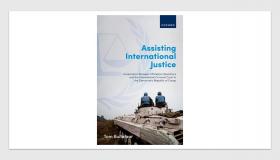
Why did I love this book?
The UN peacekeeping operation in the Democratic Republic of Congo, deployed in 1999 and still ongoing, has an annual budget of 1.13 billion dollars. It has over 16,000 military and police personnel and nearly 3,000 civilian specialists. Although it is preparing to withdraw, its duration, scale, and significance make it a fascinating case study of the UN’s work on the ground.
Buitelaar’s book examines how the UN operates by zooming in on its cooperation with other international institutions—in this case, the International Criminal Court (ICC). Drawing on interviews with senior mission officials, the book convincingly demonstrates that individuals matter at the UN. Mission leadership’s decisions shaped whether and how peacekeepers supported the ICC’s work in an environment characterized by the US’ ambivalent attitude towards the court.
Displacement, Development, and Climate Change: International organizations moving beyond their mandates
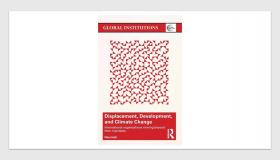
Photo by Mathias Reding on Unsplash
